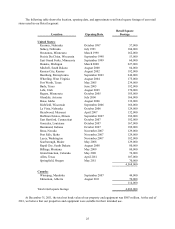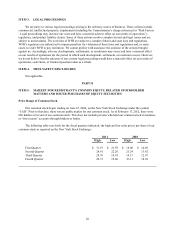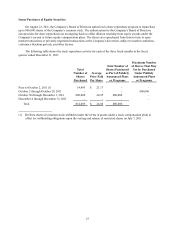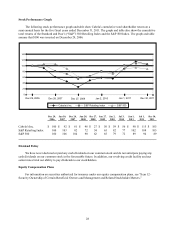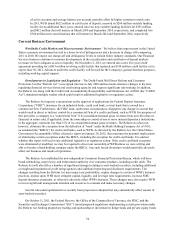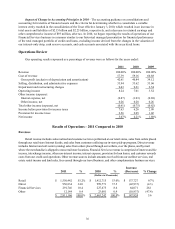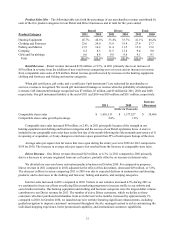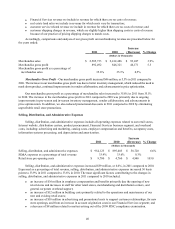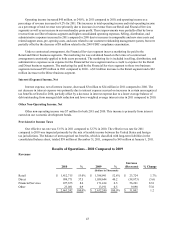Cabela's 2011 Annual Report Download - page 45
Download and view the complete annual report
Please find page 45 of the 2011 Cabela's annual report below. You can navigate through the pages in the report by either clicking on the pages listed below, or by using the keyword search tool below to find specific information within the annual report.35
(the “Volcker Rule”). The proposed regulations are complex and have been the subject of extensive comment.
As proposed, these regulations may apply to us and could limit our ability to engage in the types of transactions
covered by the Volcker Rule and may impose potentially burdensome compliance, monitoring, and reporting
obligations. There remains considerable uncertainty regarding whether the final regulations implementing the
Volcker Rule will differ from the proposed regulations, and the effect of any final regulations on our Retail and
Direct businesses and WFB.
On September 19, 2011, the SEC proposed a new rule under the Securities Act of 1933, as amended, to
implement certain provisions of the Reform Act. Under the proposed rule, an underwriter, placement agent, initial
purchaser, or sponsor of an asset-backed security, or any affiliate of any such person, shall not at any time within
one year after the first closing of the sale of the asset-backed security, engage in any transaction that would involve
or result in any material conflict of interest with respect to any investor in a transaction arising out of such activity.
The proposed rule would exempt certain risk-mitigating hedging activities, liquidity commitments, and bona fide
market-making activity. It is not clear how the final rule will differ from the proposed rule, if at all. The final rule’s
impact on the securitization market and WFB is also unclear at this time.
The Cabela’s Master Credit Card Trust and related entities (collectively referred to as the “Trust”) is
structured to come within the exemption from the Investment Company Act of 1940, as amended (the “Investment
Company Act”) provided by Investment Company Act Rule 3a-7. On August 31, 2011, the SEC issued an advance
notice of proposed rulemaking regarding possible amendments to Investment Company Act Rule 3a-7. At this
time, it is uncertain what form the related proposed and final rules will take, whether the Trust would continue to
be eligible to rely on the exemption provided by Investment Company Act Rule 3a-7, and whether the Trust would
qualify for any other Investment Company Act exemption.
On July 26, 2011, the SEC re-proposed certain rules for asset-backed securities offerings (“SEC Regulation
AB II”) which were originally proposed by the SEC on April 7, 2010. If adopted, SEC Regulation AB II would
substantially change the disclosure, reporting, and offering process for private offerings of asset-backed securities
that rely on the Rule 144A safe harbor, including the Trust’s private offerings of asset-backed securities. As
currently proposed, SEC Regulation AB II would, among other things, alter the safe harbor standards for private
placements of asset-backed securities imposing informational requirements similar to those applicable to registered
public offerings. The final form that SEC Regulation AB II may take is uncertain at this time, but it may impact
WFB’s ability and/or desire to sponsor securitization transactions in the future.
On March 29, 2011, pursuant to the provisions of the Reform Act, the SEC, the Federal Reserve, the FDIC,
and certain other federal agencies issued proposed regulations requiring securitization sponsors to retain an
economic interest in assets that they securitize. Subject to certain exceptions, the proposed regulations would
generally require the sponsor of a securitization transaction to retain at least 5% of the credit risk of the securitized
assets and would provide securitization sponsors with a number of options for satisfying this requirement. Each of
these options would require the sponsor to provide certain disclosures to investors a reasonable time prior to sale
and upon request to the SEC and the sponsor’s applicable federal banking regulator. In addition, the sponsor would
be subject to certain prohibitions on hedging, transferring, or financing the retained credit risk. If adopted, the
proposed regulations will likely affect most types of private securitization transactions, including those sponsored
by WFB. It is not clear how the final regulations will differ from the proposed regulations, if at all, or the impact
of the final regulations on WFB and its ability and willingness to continue to rely on the securitization market
for funding.
On January 20, 2011, under provisions of the Reform Act, the SEC adopted rules that require issuers of asset-
backed securities to disclose demand, repurchase, and replacement information through the periodic filing of a
new form with the SEC. One of these rules, Rule 17g-7 under the Securities Exchange Act of 1934, as amended,
requires rating agencies to disclose in any report accompanying a credit rating for an asset-backed security the
representations, warranties, and enforcement mechanisms available to investors and how they differ from those in
similar securities. Also pursuant to the provisions of the Reform Act, on January 20, 2011, the SEC issued rules that
require issuers of asset-backed securities to make publicly available the findings and conclusions of any third-party
due diligence report obtained by the issuer.


